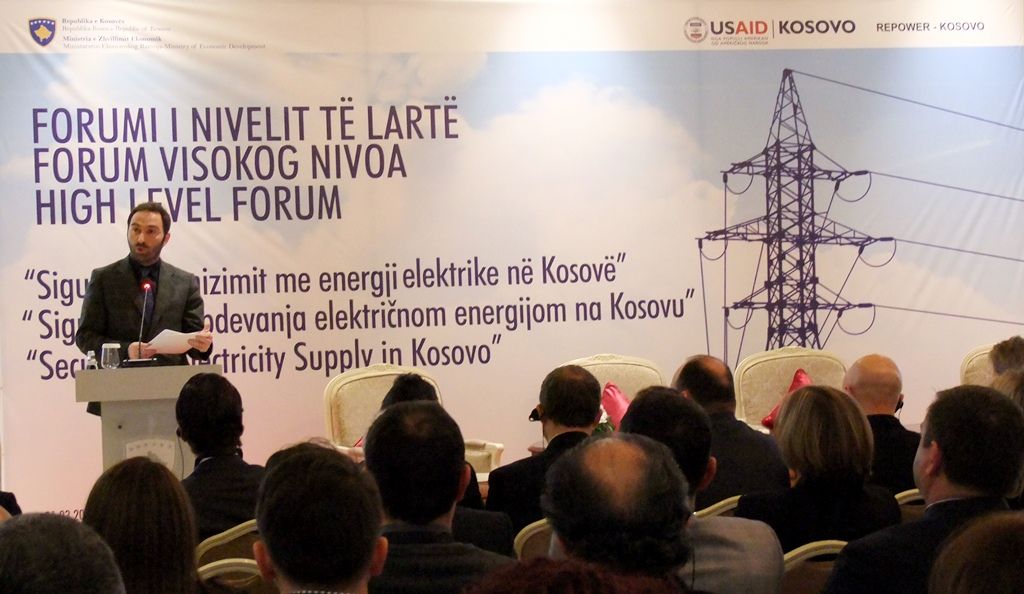Security of power supply – prerequisite for economic development
Prishtina, 01.03.2016 – Key players of the energy sector of Kosovo met in the High Level Forum “Security of Energy Supply in Kosovo”, organized by the Ministry of Economic Development and supported by USAID project REPOWER, discussing current developments in this sector, where they stressed the need for greater involvement of the business community and international partners in the development of this sector.
The opening of the forum was attended by institutional representatives of the Republic of Kosovo, Albania and the international community, including Prime Minister Isa Mustafa, Minister of Economic Development, Blerand Stavileci, US Ambassador in Kosovo, Greg Delawie, Director of the Bank World Office Kosovo, Marco Mantovanelli, and representatives of the Ministry of Energy and Industry of Albania, as well as representatives of the industry, non-governmental organizations, academia, business and the media.
According to organizers, 2016 will bring a number of challenges and opportunities, not only for the energy sector, but for the business sector in general, and will present an opportunity for growth in the overall economy. However, to achieve energy security, Kosovo will need active support from its international partners.
“We are here together, all key actors in the energy sector, consumer groups, government and regulatory bodies and international partners, to strengthen our joint understanding of these challenges and to express our commitment to overcome them”, said Minister Stavileci.
He said that the Government’s objectives are based on a balance of these four premises: security of supply for the needs of Kosovo; affordable energy prices for citizens and businesses; protecting the environment and efficient use of resources; and increased private investment and creation of new jobs.
Prime Minister, Isa Mustafa said that as a basic prerequisite for economic development is to stable electricity supply, and we should achieve this. “Our basic orientation is to invest in building the Kosova e Re Power Plant. We highly appreciate the results achieved thus far, and the agreement signed with US private investors, with the support of the World Bank, and we remain committed to implement this project”, he said, expressing the readiness of the Government to comply with environmental standards.
From his part, the US Ambassador in Kosovo, Greg Delawie, stressed the importance of the energy sector for economic growth, “One of the main objectives of the US assistance the through USAID is economic growth and no sector is more vital for growth than the energy sector”, he said.
Marco Mantovanelli, Manager of the World Bank for Kosovo, said that his institution will continue to be an important partner in the development of Kosovo’s energy sector.
Representatives of Kosovo institutions and international partners agreed that the electricity generation in Kosovo relies on coal, and based on monetary and fiscal policies in the medium-term it is not possible to substantially increase power generation from renewable sources.
However, speakers emphasized that new initiatives have been implemented by the Government to promote green energy, but renewable energy projects need subsidies to become profitable, which will ultimately be paid by consumers. In the context of rising energy prices, the Kosovo Government should protect its vulnerable consumers from rising prices.
Participants agreed that a very important component for stability of supply and operation of the system is the single electricity market with Albania. Electricity generated in Albania is mainly based on hydro sources, whereas Kosovo relies on coal, and these are considered the cheapest and safest alternatives for joint supply of both countries, thus eliminating seasonal shortages.
It was a common conclusion of all participants that the recovery of Kosovo’s economy depends on the success of energy policies, and international partners should support such efforts by actions, giving Kosovo discretion in terms of EU environmental standards.

